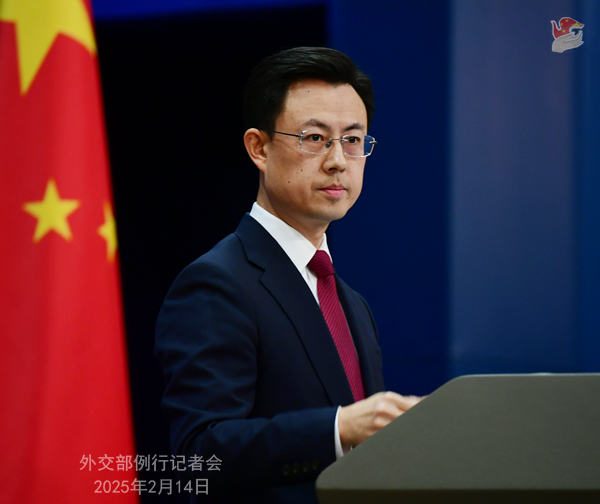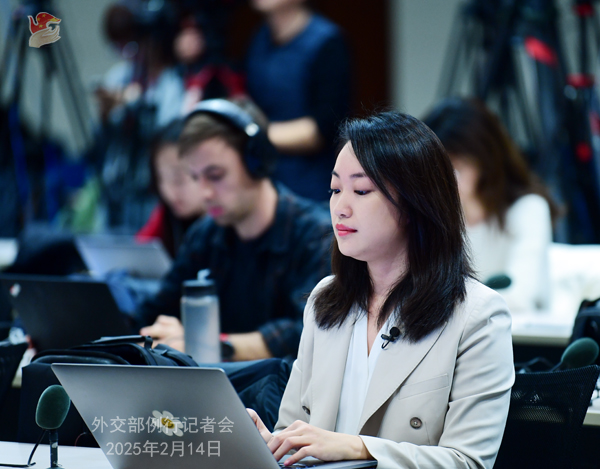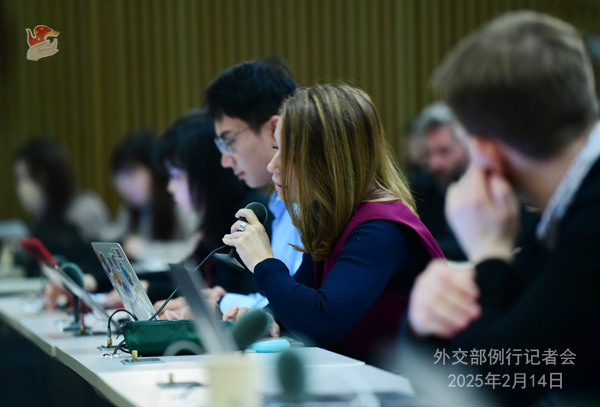
CGTN: The Ninth Asian Winter Games is coming to a close. This is the largest ever edition of the Games in terms of overall participation, which wins widespread praise. As President of the Olympic Council of Asia (OCA) Raja Randhir Singh noted, the Asian Winter Games not only provides a stage for athletes but also serves as a platform for exchanges among various Asian countries. Do you have any comment on this?
Guo Jiakun: The Ninth Asian Winter Games will come to a successful conclusion soon, but the inspiration of “Dream of Winter, Love among Asia” will not end and the shared aspiration and pursuit for peace, development and friendship will continue. Also, what we witnessed in Harbin will leave a deep imprint on the history of Asian Winter Games.
At this Asian Winter Games, athletes have competed while showing mutual respect and cheering for each other, telling a story of sports for peace, unity and inclusiveness. Cambodia and Saudi Arabia sent their athletes to the tournament for the first time, which means that winter sports are no longer limited to countries in the high-latitude region and that the ice and snow economy has become a new growth driver. At the events, we saw the athlete who stood alone as Jordan’s sole representative and the Thai athlete who pursued his dream in Harbin after attending the Beijing Winter Olympics. More than 1,200 athletes from 34 countries and regions have gathered in Harbin, which marks the expansion of the big family of Asia for winter sports and underlines the prevailing trend of solidarity and friendship in Asia.
“Ever Onward” is the motto of the OCA. China stands ready to work with other Asian countries and the international community to continuously move forward the international Olympic cause and make greater contributions to the building of a community with a shared future for mankind.
Reuters: U.S. President Donald Trump has said the U.S. will increase military sales to India starting this year and will eventually provide F-35 fighter jets. Does China’s Foreign Ministry have any comment on this?
Guo Jiakun: No one should make China an issue in the relations and cooperation between countries, or seek to instigate bloc politics and confrontation. The Asia-Pacific is a stellar example of peace and development, not an arena for geopolitical games. Ganging up to form exclusive groupings and engaging in bloc politics and confrontation will not bring about security, and will by no means keep the Asia-Pacific and the whole world peaceful and stable.

CCTV: Foreign Minister Wang Yi just concluded his visit to the U.K. Can you share more information about the visit? What outcomes have been achieved?
Guo Jiakun: From February 12 to 13, at the invitation of U.K. Secretary of State for Foreign, Commonwealth and Development Affairs David Lammy, Member of the Political Bureau of the CPC Central Committee and Minister of Foreign Affairs Wang Yi visited the U.K. and held the 10th China-U.K. Strategic Dialogue with the Secretary. He also met with U.K. Prime Minister Keir Starmer and Prime Minister’s National Security Adviser Jonathan Powell. The visit was a great success and achieved positive outcomes.
The visit is an important move of implementing the common understandings between leaders of the two countries. At the end of last year, President Xi Jinping held a successful meeting with U.K. Prime Minister Keir Starmer on the sidelines of the G20 Summit, which started the progress of improving and developing the China-U.K. relations. Foreign Minister Wang Yi visited the U.K. after 10 years and the two sides held a new round of strategic dialogue after seven years. This speaks to both sides’ willingness of following up on the common understandings between leaders of the two countries, and stabilizing and improving the bilateral ties. Both sides agreed to follow the important common understandings between leaders of the two countries, cement strategic communication, enhance mutual understanding, uphold openness and cooperation as the underlying feature, explore ways to expand common interests and work for the steady and sustained growth of China-U.K. relations.
The visit enhanced strategic communication between China and the U.K. China spoke positively of the Labor government’s reasonable and pragmatic China policy, and stressed that China views the U.K. as an important strategic partner and stands ready to deepen and expand cooperation in various areas and work for new progress in bilateral relations. The U.K. said that a pragmatic U.K.-China relationship serves the interest of the U.K. and it is committed to developing a sustained relationship with China that is stable, mature and strong. The two sides would like to engage in candid and constructive dialogue in the spirit of mutual respect to properly handle differences and disagreements.
The visit drew the roadmap for bilateral exchanges and cooperation going forward. The two sides will hold the China-U.K. Energy Dialogue, the Meeting of China-U.K. Joint Commission on Science, Technology and Innovation (STI) Cooperation, and the China-U.K. Education Summit, accelerate preparations for hosting dialogues under mechanisms of the China-U.K. Joint Trade and Economic Commission, health care and industrial cooperation, create highlights in cooperation on financial services, clean energy and AI, and deepen cooperation on global governance, development partnership, climate response and cybersecurity.
The two sides had extensive and in-depth communication and reached important common understandings on the international situation, hotspot issues and global governance. The two sides agreed that both countries play an important role in global affairs and should enhance strategic communication, jointly uphold global peace and stability and work for economic growth.
RIA Novosti: U.S. President Donald Trump said yesterday that he plans to meet with the leadership of China and Russia to discuss military deescalation, especially regarding nuclear weapons. He also said that at the meeting with the leaders of China and Russia, he wants to propose that all three countries cut their defense budget in half. I have two questions. First, is China ready to engage in nuclear talks with Russia and the U.S. and second, in your point of view, is there any possibility that the three countries can agree to cut their defense budget?
Guo Jiakun: We noted the reports. It is widely known in the world that the U.S. and Russia combined own over 90 percent of the world’s nuclear weapons. Nuclear disarmament must follow the basic principle of “maintaining global strategic stability” and “undiminished security for all.” Sitting on the world’s biggest nuclear arsenals, the U.S. and Russia should earnestly fulfill their special and primary responsibility for nuclear disarmament, further make drastic and substantive cuts to their nuclear arsenals, and create necessary conditions for other nuclear-weapon states to join in the nuclear disarmament process. There has been extensive agreement on this among the international community.
Chinese modernization will be achieved through peaceful development. China follows a policy of “no first use” of nuclear weapons and a nuclear strategy that focuses on self-defense. China always keeps its nuclear strength at the minimum level required by national security, and never engages in arms race with anyone. China stands ready to work with all parties to firmly support the multilateral arms control regime with the U.N. at its core and contribute to world peace and security.
On defense budget, let me stress that the U.S. military spending accounted for 40 percent of the world’s total in 2024, which is the highest in the world, and higher than that of the following eight countries combined. The U.S. “National Defense Authorization Act for Fiscal Year 2025” further increased the military budget to about USD 895 billion. The U.S. side has been advocating “America First,” then it should be the first to cut military spending.
China’s national defense spending is open, transparent, reasonable and appropriate. Compared with major military countries such as the U.S., the shares of China’s national defense spending in both GDP and fiscal expenditure are relatively low, and China’s defense spending per citizen and per service member is also relatively low. China is committed to peaceful development and follows a defensive national defense policy. It is a stabilizer in the turbulent world, a positive force for international security and a doer in safeguarding peace. Facts have proven and will continue to prove that China makes finite national defense spending to safeguard our nation’s sovereignty, security and development interests, and to uphold world peace.

TASS: Today marks the 75th anniversary of the signing of the Treaty of Friendship, Alliance and Mutual Assistance between China and the USSR. How do you comment on the development of Russia-China cooperation? Will the recent signs of possible improvements in Moscow-Washington ties affect the current cooperation between Russia and China in some aspects?
Guo Jiakun: China and Russia are comprehensive strategic partners of coordination for a new era. In recent years, under the strategic guidance of the two presidents, our relationship has overcome external disturbances, maintained sound and stable growth, and been at its best in history. Cooperation between China and Russia does not target any third party and will not be affected by any factor from any third party. China stands ready to work with Russia to stay committed to non-alliance, non-confrontation and not targeting any third party, consolidate the lasting good-neighborliness and friendship, advance comprehensive strategic coordination, and deepen mutually beneficial cooperation.
PTI: I would like to ask this question about the meeting between Prime Minister Modi and U.S. President Trump in Washington. They had wide-ranging talks today. The joint statement says that they agreed to advance India-U.S. defense ties, launched a new initiative, the U.S.-India COMPACT (Catalyzing Opportunities for Military Partnership, Accelerated Commerce & Technology) for the 21st century. They also reaffirmed that a close partnership between the U.S. and India is central to a free, open, peaceful and prosperous Indo-Pacific region and spoke of strengthening Quad partnership. They also agreed to strengthen cooperation against terrorist threats, eliminate safe havens, terror outfits, especially those based in Pakistan. How does China view this meeting? What is China’s reaction?
Guo Jiakun: I answered the question just now. Let me reiterate that China believes that relations and cooperation between countries should not target any third party or harm others’ interests, and should be conducive to regional peace, stability and prosperity. The Asia-Pacific is not an arena for geopolitical games. Ganging up to form exclusive groupings and engaging in bloc politics and confrontation will not bring about security, and can by no means keep the Asia-Pacific and the whole world peaceful and stable.
AFP: There have been reports today of a bombing attack in southwest Pakistan that killed at least 10 people. Does the Foreign Ministry know if this targeted Chinese nationals or if any Chinese citizens were involved?
Guo Jiakun: China noted the report and strongly condemns the attack. Based on what I know at the moment, no Chinese national was involved in the attack.